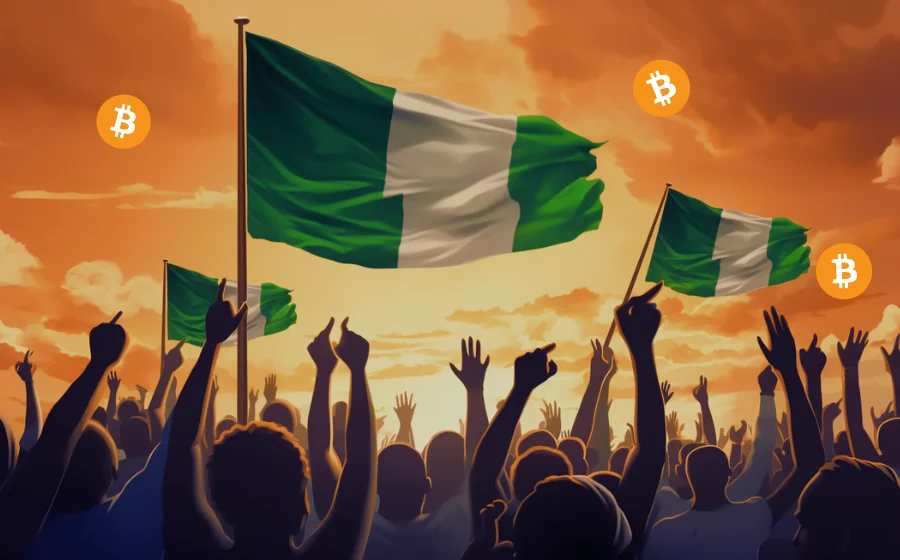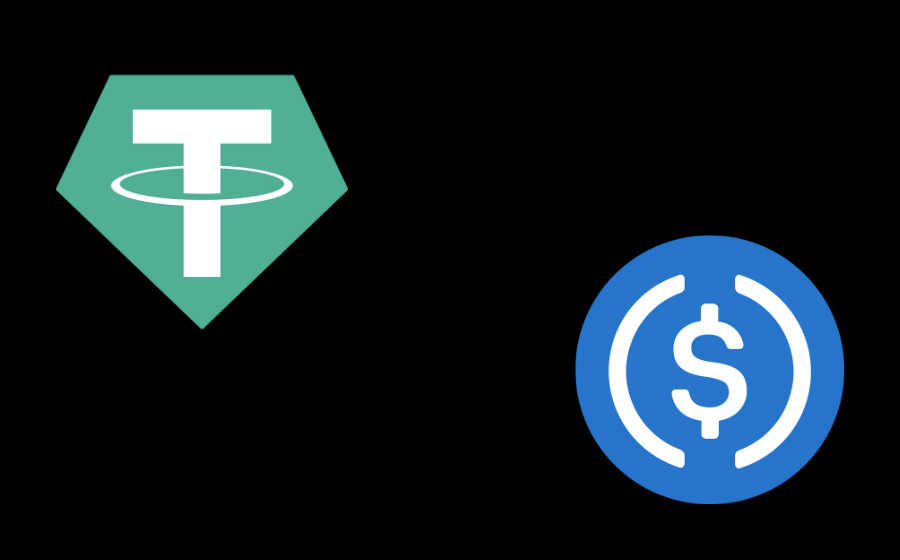
KEYTAKEAWAYS
- Nigeria has over 22 million cryptocurrency holders, constituting 10% of its population, due to severe inflation and forex controls.
- Despite challenges in the banking system, Nigerians are turning to cryptocurrencies as a hedge against inflation and currency depreciation.
- The adoption of Web3 technologies like cryptocurrencies is transforming Africa's financial landscape, offering solutions to common challenges like inflation and employment.

- KEY TAKEAWAYS
- NIGERIA: A LAND OF RICHES AND ITS IMPOVERISHED PEOPLE
- VAST INCOME DISPARITIES: MONEY FLOWS TO THE WEALTHY!
- LIMITED DAPP ECOSYSTEM, BUT CRYPTOCURRENCY GAINS ENTRY INTO THE WALLETS OF 22 MILLION
- DIASPORA THOUGHTS FLOWING INTO CRYPTO ACCOUNTS
- INFLATION AND CURRENCY DEPRECIATION DRIVE FUNDS INTO CRYPTOCURRENCIES LIKE BTC
- BANKING SYSTEM COLLAPSE: TRANSITIONING FROM WEB2 TO WEB3
- WEB3 CHANGING AFRICA, AND AFRICA CHANGING WEB3
- DISCLAIMER
- WRITER’S INTRO
CONTENT
Nigeria stands as the second-largest user of Bitcoin, trailing only behind the United States, with over 22 million cryptocurrency holders, constituting 10% of its total population.
As the largest economy in Africa, Nigeria grapples with severe inflation and forex controls that limit citizens from hedging against inflation through foreign currency exchange. As a result, residents have turned to cryptocurrencies to circumvent regulation and preserve the value of their assets.
The decentralized and global nature of Web3 aligns well with the local demand.
NIGERIA: A LAND OF RICHES AND ITS IMPOVERISHED PEOPLE
Welcome to the West Coast! Nigeria, situated on the west coast of Africa, ranks as Africa’s largest nation and adopts English as its official language. Contrary to common perceptions, Nigerians are not as impoverished as one might think, and not everyone lacks a mobile phone.
One out of every six Africans is Nigerian. This land is abundantly blessed with natural resources like petroleum, natural gas, and more. Additionally, a tropical climate provides ample warmth and moisture, thanks to the Niger River.

So, despite persistent poverty and underdeveloped urban infrastructure, the influence of budget-friendly mobile phone brands like Transsion has made phones accessible to the locals, priced between $20 and $40. Thus, mobile network penetration remains relatively high, with a broadband penetration rate of 41%. There are 102 million internet users, equivalent to China’s level in 2013.
VAST INCOME DISPARITIES: MONEY FLOWS TO THE WEALTHY!
Despite abundant resources, the income of the residents is not particularly high. According to World Bank data, there are 95.1 million people living in poverty, constituting half of the country’s population.
However, Nigeria’s top five wealthiest individuals have amassed a collective fortune of $29.9 billion, while the average worker earns just 18,000 Naira per month, equivalent to $43.

LIMITED DAPP ECOSYSTEM, BUT CRYPTOCURRENCY GAINS ENTRY INTO THE WALLETS OF 22 MILLION
According to Chainalysis’s 2022 Global Crypto Adoption Index, Nigeria ranks 11th globally, and 17th in terms of trading volume on peer-to-peer exchanges, similar to Binance’s peer-to-peer exchange.
It is estimated that over 22 million people now hold cryptocurrencies, making up 10.3% of Nigeria’s total population. In 2020, Nigeria ranked third globally, after the United States and Russia, in terms of Bitcoin trading volume, with transactions exceeding $400 million.

DIASPORA THOUGHTS FLOWING INTO CRYPTO ACCOUNTS
English being the official language of Nigeria, an estimated 21.7 million Nigerians live abroad, escaping the underdevelopment of their homeland. This accounts for one-tenth of Nigeria’s total population.
This massive diaspora population brings in significant remittances, which amounted to $24.31 billion in 2018, $23.81 billion in 2019, and decreased to $17.21 billion in 2020. The declining remittance figures could be attributed to the growing use of cryptocurrencies, as Bitcoin, being unregulated, facilitated transactions.
Before the emergence of cryptocurrencies, services such as Western Union and MoneyGram were the primary means for these expatriates to send money back home. When a year’s worth of earnings sent home by overseas workers is subjected to the local capitalists’ hefty deductions, often amounting to 10%, and takes 2-3 days to arrive, the impact on the users is significant.
Users not only grapple with the 10% transaction fees but also with unreasonable exchange rates due to local government forex controls.
The Nigerian government has stringent forex control policies in place. The official exchange rate is 460 Naira to one US dollar, while the parallel market (black market) rate stands at 765 Naira to one US dollar. Hence, BTC acts as an intermediary for black market exchange, allowing recipients to convert it into more Naira on the black market.
INFLATION AND CURRENCY DEPRECIATION DRIVE FUNDS INTO CRYPTOCURRENCIES LIKE BTC
Inflation affects every African nation, with Nigeria being no exception, especially in 2021, where the average CPI inflation rate exceeded 17%. In January 2022, year-on-year inflation surged by 21%.
Currency depreciation often accompanies inflation. Since 2013, the Naira has depreciated by nearly 70% against the US dollar, falling from $0.0062 to $0.0021 per US dollar. This has fueled a growing enthusiasm for digital assets.

(Image Source :Google Financer)
Despite the Nigerian Central Bank’s strong stance against cryptocurrencies in February 2021, stating that they “contravened existing laws” and prohibiting commercial banks from
engaging in cryptocurrency transactions, it has failed to suppress Nigerians’ enthusiasm for digital assets. TenSs of millions of Nigerians, especially the youth, have continued to convert their Naira into Bitcoin and USDT.

BANKING SYSTEM COLLAPSE: TRANSITIONING FROM WEB2 TO WEB3
As of the end of 2020, only 64% of Nigerian adults were familiar with financial services.
Nigeria’s banking infrastructure is notably weak and has come close to collapsing. In January 2022, interbank transfer discrepancies snowballed into internal banking transfer issues.
Many remitters’ money could be at risk of irretrievability. The immediate cause of this banking crisis was the Nigerian government’s “cashless policy,” resulting in insufficient new cash reserves at banks. Simultaneously, end-of-month salary withdrawals and Nigeria’s general election created immense withdrawal pressures, leading to the paralysis of banking operations.
Such incidents are not isolated; Nigeria’s interbank transfer system (NIBSS) often experiences similar problems. NIBSS is significantly outdated, with most ATM devices being secondhand products from Europe and the US.
Furthermore, interbank reconciliation systems among various banks are outdated, with banks exchanging Excel spreadsheets periodically. Any minor error in this manual reconciliation process could jeopardize customer fund security.
In addition to the problematic interbank transfer system, high non-performing loan rates and wider deposit-loan interest rate spreads put depositors in an insecure position.
According to a report by “The Punch” in June 2022, the savings deposit interest rate in Nigerian banks was 1.28% in March, while the highest lending rate was 26.61%, resulting in a significant spread of 25.33%. Faced with an inflation rate of 16.8%, this represents severe exploitation of depositors.
Simultaneously, Nigeria’s banking industry had a non-performing loan rate of 6% in 2020, surpassing global standards. During the same period, China had a non-performing loan rate of 1.92%, and the United States had 0.96%. It is evident that exposing depositors to such risks in a low-interest rate environment is patently unfair.
The Nigerian government has made efforts to bring about change through digital currency.
On October 25, 2021, Nigerian President Buhari announced the issuance of the e-Naira, Nigeria becoming the first African country to introduce a digital currency. However, the centralized e-Naira has not transformed Nigeria’s financial landscape. After a year of aggressive promotion by the government, e-Naira’s adoption remains at only 0.5%, with a total transaction volume of just $9 million.
The most significant challenge for e-Naira lies in the lack of trust among the populace regarding any government initiative. Users prefer to employ cryptocurrencies over e-Naira

(Image Source :https://cdn-img.panewslab.com/panews/images/ffEWzJDQSs.png)
For Nigerians, the only choice is Web3. Only Web3 can provide access to global financial Sservices enjoyed by the global elite as long as they have an internet connection.
To the ordinary people of Nigeria, oil doesn’t belong to them, the land doesn’t belong to them, skyscrapers don’t belong to them, and the money in the bank might disappear. Only the tokens in their wallets are truly theirs.
WEB3 CHANGING AFRICA, AND AFRICA CHANGING WEB3
If we only focus on candlestick charts and the volatile price movements, Web3 might appear as just an investment or speculative tool. However, when we delve into the value Web3 offers to people in Asia and Africa, we find that Web3 is also a form of “social welfare.”
In this world, with over a billion people in Africa, often ignored by the global mainstream, they face common challenges like inflation, mobile payments, and employment.
Web3 emerges as a top-performing solution, offering services such as payments and finance that can be transmitted over the internet, transcending governments and geography.
Consequently, Web3 is poised to witness significant user growth. While cryptocurrencies were born in the West and the East, perhaps “Africa” is the cradle of cryptocurrency growth.
Looking for the latest scoop and cool insights from CoinRank? Hit up our Twitter and stay in the loop with all our fresh stories!















